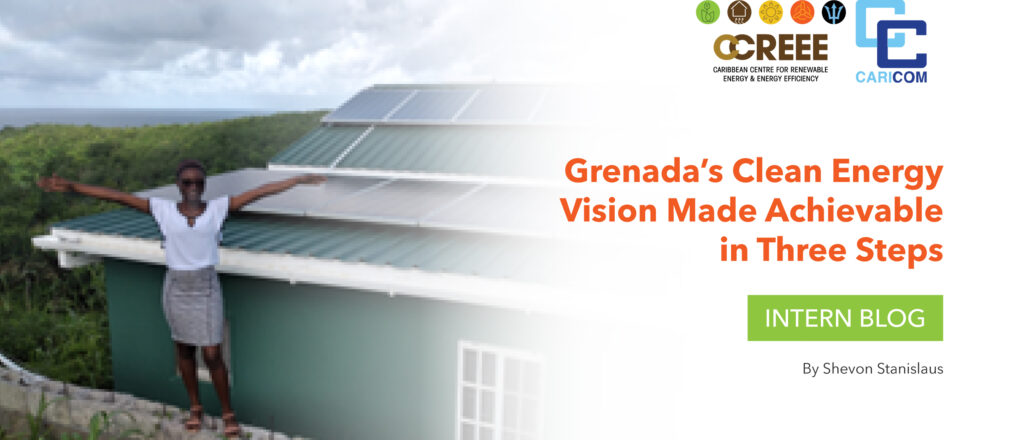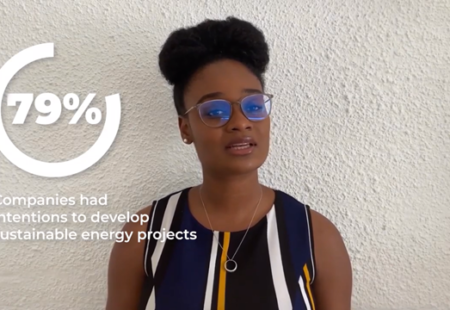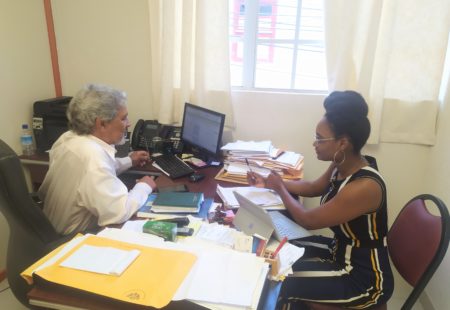Grenada’s Clean Energy Vision Made Achievable in Three Steps

By Shevon Stanislaus, Grenada
I was elated when I was selected as an intern for Caribbean Centre for Renewable Energy and Energy Efficiency (CCREEE) in 2022. It was my first time working for a regional organization, but as a junior consultant, I already had the opportunity to work in a remote, semi-independent setting on other projects. Thus, I was ready for the journey ahead. I perceived the tasks would be somewhat difficult because they were centred around data collection from stakeholders. In a small island developing state with often limited capacity, data collection has always been a challenge. Nevertheless, I was determined and ready to overcome the challenges. I went through the process and collected as much data as possible.
When I saw the call for interns this year, I decided to reapply because I wanted to get a more in-depth update concerning Grenada’s progress towards achieving its renewable energy (RE) targets. So here I am, once again, a 2023 Grenada CCREEE intern.
To date, Grenada’s national RE targets remain the same: 100% penetration by 2030 and 70% by 2027. Considering that RE is only 6.5% of the generating capacity, I believe our first step should be to revise and set more realistic RE targets. Those targets were set in 2012 and 2015, more than 10 years ago. Yet we are nowhere close to achieving them and should therefore take a closer look at the barriers that might be preventing success. We must ask this question: Do we have the human, legal and technological capacity needed to achieve 100% of RE in seven years given we were only able to achieve 6.5% in 11 years? If not, we must reevaluate.
On a positive note, the new National Energy Policy (NEP) for 2023 to 2035 should begin to address the low penetration of RE and help us in transitioning and meeting our RE targets. We had the NEP of 2011, yet that did not seem to help us move forward towards achieving set targets. We must prioritise our transformation to RE. The updated NEP should help achieve that transformation or transition with a monitoring framework embedded into this policy framework, making it interactive and effective towards achieving our RE goals.
Education and awareness are major barriers to our progress towards achieving RE targets, so we must also provide additional incentives for people to gravitate towards RE. Here in Grenada, incentives offered include 100% concession on all RE equipment and accessories plus VAT exemptions and a 75% concession on hybrid and RE vehicles. However, there are no incentives on RE for hybrid vehicle insurance, and the start-up cost of using RE for electricity at residential homes is too high for the average person.
Regarding the internship, just like the 2021 report card, there were several challenges this year. The experience reminded me of how important it is to regularly collect accurate data. On that journey, multiple sources requested the same data where the resulting data were very inconsistent. Other data was requested, and no response was received. Some requested data were not collected at all. Nevertheless, although difficult, the task was completed and lessons learnt. The world now has a better idea concerning the status of Grenada’s energy sector compared to other Caribbean islands. Let us all play our part in this transition to cleaner energy and, in turn, a healthier living environment.



